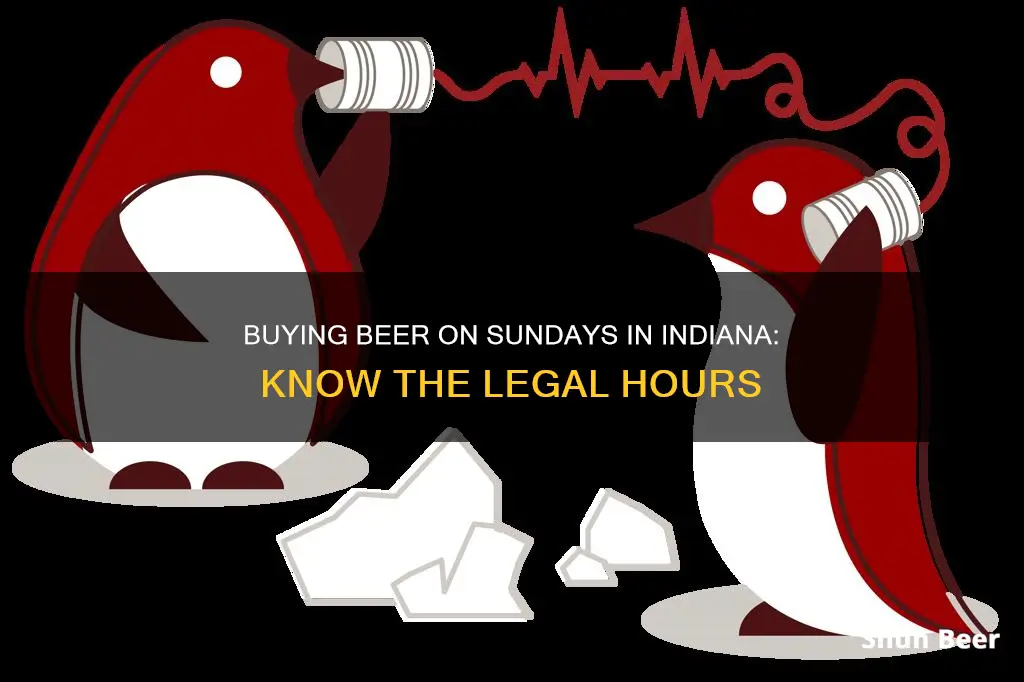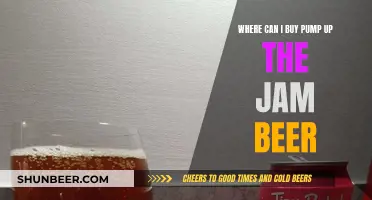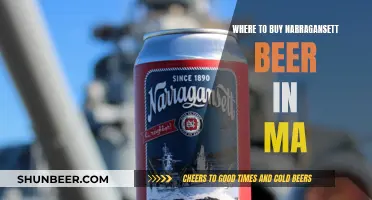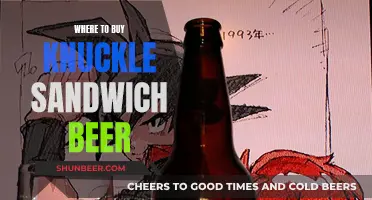
Indiana's alcohol laws have been described as confusing, contradictory, and archaic. Until 2018, the state banned all Sunday alcohol sales outside of bars and restaurants. Now, alcohol can be purchased from liquor, grocery, and convenience stores on Sundays, but only between the hours of 12 pm and 8 pm. This is in contrast to the rest of the week, when alcohol can be purchased from 7 am to 3 am.
| Characteristics | Values |
|---|---|
| Day of the week | Sunday |
| Time | 12:00 pm to 8:00 pm |
| Locations | Liquor stores, groceries, pharmacies, and convenience stores |
What You'll Learn

Beer can be bought on Sundays in Indiana from noon to 8 pm
Indiana's alcohol laws have been described as "archaic and obsolete, at times contradictory, and often confusing". They are a legacy of Prohibition, and of the end of Prohibition, which allowed states to set their own rules.
Until 2018, Indiana banned all Sunday alcohol sales outside of bars and restaurants. That ban was lifted when Senate Bill 1 was signed by Gov. Eric Holcomb on February 28, 2018.
Now, beer can be bought on Sundays in Indiana from noon to 8 pm. This applies to liquor, grocery, and convenience stores.
Alcohol can be sold between 7 am and 3 am throughout the rest of the week.
Indiana's alcohol laws are monitored and controlled by the Indiana Alcohol and Tobacco Commission. They regulate all aspects of alcohol and tobacco, including manufacturing, selling, possession, and use.
Indiana is one of 26 states that allow alcohol to be sold in grocery stores.
Buying Beer Late in Suffolk County, NY: Know the Rules
You may want to see also

Alcohol can be bought in Indiana from 7 am to 3 am
Indiana's alcohol laws have been described as confusing, contradictory, and archaic. They are a legacy of Prohibition, and of its end, which allowed states to set their own rules.
Indiana's alcohol laws have been subject to recent changes. In 2018, a ban on Sunday alcohol sales was repealed, allowing alcohol to be sold from 12 pm to 8 pm on Sundays. In 2021, the state also made permanent a policy of allowing bars and restaurants to sell carryout drinks, a change that was originally implemented as a temporary measure to support businesses during the COVID-19 pandemic.
Indiana's alcohol laws also include some other unique features. For example, the state has no restrictions on open containers of alcohol in public spaces, and passengers in a vehicle are allowed to have an open container if they are paying for a ride. However, Indiana does ban "happy hour", prohibiting retailers from selling alcoholic beverages at a reduced cost during a portion of the day.
Buying Local Beer: A Guide to Craft Brews
You may want to see also

Alcohol can be bought in Indiana grocery stores
Indiana's alcohol laws have been described as confusing, contradictory, and archaic. They are a legacy of Prohibition, and of Prohibition's end, which allowed states to set their own rules.
Indiana's Sunday alcohol ban was lifted only recently, in 2018. Previously, the sale of alcohol on Sundays was prohibited outside of bars and restaurants. The ban was a remnant of Prohibition-era blue laws, which were largely supported by religious groups who wanted to preserve Sunday as a day of worship.
Liquor stores were also proponents of the ban. Sunday is the second busiest grocery shopping day of the week, and allowing alcohol sales on Sundays would mean consumers could stock up on alcohol at the grocery store rather than the liquor store.
Indiana's alcohol laws continue to be a point of contention for many residents. Some find the restrictions on Sunday sales inconvenient and frustrating, especially when compared to neighbouring states.
There are also other unique aspects to Indiana's alcohol laws. For example, Indiana is one of the few states that allow public intoxication, as long as the intoxicated person is not endangering themselves or others, breaching the peace, or harassing or alarming another person. Indiana also allows people to drink alcohol in public places, and passengers can consume alcohol in a vehicle if they are paying for their ride.
Indiana has a state excise tax on alcohol, and a sales tax of 7% applies to all alcohol purchases. The state also has a ban on happy hour, prohibiting establishments from providing discounts on alcohol during certain times of the day.
Schlitz Beer: Michigan's Best-Kept Secret?
You may want to see also

Alcohol can be bought in Indiana on public holidays
Indiana's alcohol laws have been described as \"archaic and obsolete, at times contradictory, and often confusing". They are a legacy of Prohibition, and of its end, which allowed states to set their own rules.
Alcohol can be purchased in Indiana on Sundays from noon to 8 pm, and from 7 am to 3 am Monday to Saturday. This applies to liquor, grocery, and convenience stores. Bars and restaurants can sell alcohol from 7 am to 3 am on Sundays.
Indiana's alcohol laws have been influenced by the lobbying power of liquor stores, which sought to protect their market share from groceries, pharmacies, and big-box stores. Religious groups have also historically sought to restrict alcohol sales on Sundays to preserve the day for worship.
Indiana's alcohol laws have been amended in recent years to allow for alcohol sales on Sundays, as well as on Election Day and Christmas Day. In response to the COVID-19 pandemic, the state also relaxed policies around ordering alcoholic drinks with takeout orders, making the change permanent in 2021.
Indiana is one of 26 states that allow alcohol to be sold in grocery stores. Indiana also allows people to drink alcohol in public places, and passengers can consume alcohol in a vehicle if they are paying for their ride. However, open containers in vehicles are generally prohibited.
Indiana has a ban on "happy hour", prohibiting establishments from selling alcohol at reduced prices during a certain period of the day. While all-day drink specials are allowed, opponents of happy hour argue that it encourages binge drinking.
Stiegl Beer: Where to Buy and What to Know
You may want to see also

Alcohol cannot be bought in Indiana before noon on Sundays
Indiana's alcohol laws have been described as "archaic and obsolete, at times contradictory, and often confusing". They are a legacy of Prohibition, and of the end of Prohibition, which allowed states to set their own rules.
Until 2018, Indiana banned all Sunday alcohol sales outside of bars and restaurants. That ban was repealed when Senate Bill 1 was signed by Gov. Eric Holcomb on February 28, 2018.
Now, alcohol sales at liquor, grocery, and convenience stores are limited from noon to 8 pm on Sundays. This means that alcohol cannot be bought before noon on Sundays in Indiana.
State law permits the sale of alcohol from 7 am to 3 am Sunday through Saturday. However, hours for carryout alcohol sales from liquor stores, groceries, pharmacies, and convenience stores are restricted to the hours of noon to 8 pm on Sundays.
Indiana's Sunday alcohol ban lingered for years due mostly to economic reasons, with religious objections rarely being part of the debate. The biggest roadblock to overturning the ban was the liquor store industry, which sought to protect its market share from groceries, pharmacies, and big-box stores.
With Sunday being the second busiest grocery shopping day of the week, liquor stores could lose sales if the public stocks up on their regular Sunday shopping trips. Liquor stores have also objected to the added costs of staffing on Sundays. Finally, some anti-alcohol organizations don't want to give consumers another day to buy alcohol.
Despite these objections, as of March 4, 2018, Indiana residents have been allowed to purchase alcohol on Sundays.
Whoop Dub Beer: Where to Buy and Enjoy
You may want to see also
Frequently asked questions
You can buy beer from noon to 8 p.m. on Sundays in Indiana.
Alcohol sales are permitted from 7 a.m. to 3 a.m. every day in Indiana. However, on Sundays, alcohol sales at liquor, grocery, and convenience stores are restricted to noon to 8 p.m.
The restrictions on Sunday alcohol sales in Indiana are a remnant of Prohibition-era "blue laws", influenced by religious groups who wanted to preserve Sunday as a day of worship. Liquor stores also supported the ban to protect their market share from competition by grocery and convenience stores.







